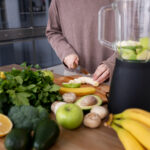
In this article
Overview
Imagine being able to support your body’s energy production, improve digestion, and enhance your skin’s health—all through your diet. Niacin, also known as vitamin B3, plays a crucial role in these processes and more. Yet, many people overlook the importance of this essential nutrient. In today’s fast-paced world, understanding the foods that can help you maintain optimal niacin levels is more vital than ever.
Understanding Niacin
Niacin is a water-soluble vitamin that belongs to the B-vitamin family. It is essential for converting food into energy, maintaining healthy skin, and supporting the nervous and digestive systems. Unlike some other vitamins, niacin can be synthesized by the body from the amino acid tryptophan, but it’s still important to consume niacin-rich foods to meet your daily needs. The recommended daily allowance (RDA) for niacin varies by age and gender, but on average, adults require about 14-16 mg per day.
Top Niacin-Rich Foods
- Turkey
- Why It’s Great: Turkey, especially the white meat, is a fantastic source of niacin. A single serving of turkey breast provides more than half of the daily recommended intake of niacin, making it an excellent option for boosting your levels.
- Health Benefits: Beyond its niacin content, turkey is also rich in protein and low in fat, supporting muscle growth and aiding in weight management.
- Chicken
- Why It’s Great: Similar to turkey, chicken is another poultry option packed with niacin. Just one cooked chicken breast can provide over 12 mg of niacin, covering 75% of the daily requirement for most adults.
- Health Benefits: Chicken is not only a niacin powerhouse but also a versatile and lean protein source that can be incorporated into a variety of dishes to support overall health.
- Tuna
- Why It’s Great: Tuna, whether fresh or canned, is among the richest sources of niacin. A mere 3-ounce serving of canned tuna in water can offer nearly 11 mg of niacin, meeting about 70% of your daily needs.
- Health Benefits: In addition to niacin, tuna is high in omega-3 fatty acids, which are essential for heart health and reducing inflammation.
- Mushrooms
- Why It’s Great: For those following a plant-based diet, mushrooms are an excellent way to boost niacin intake. Particularly, portobello and shiitake mushrooms are known for their high niacin content, offering up to 4 mg per cup cooked.
- Health Benefits: Besides niacin, mushrooms are low in calories and rich in antioxidants, making them a great addition to any diet aimed at disease prevention.
- Peanuts
- Why It’s Great: Peanuts and peanut butter are another great plant-based source of niacin. Just 2 tablespoons of peanut butter can deliver around 4.3 mg of niacin, which is about 25% of the daily requirement.
- Health Benefits: Peanuts are not only rich in niacin but also contain healthy fats and protein, promoting heart health and keeping you feeling full longer.
- Liver
- Why It’s Great: While it may not be everyone’s favorite, liver is one of the most concentrated sources of niacin. A 3-ounce serving of beef liver can provide more than 15 mg of niacin, fulfilling nearly all of an adult’s daily requirement.
- Health Benefits: Liver is also packed with other essential nutrients like iron, vitamin A, and folate, making it a true superfood for those who enjoy it.
Niacin Sources You Shouldn’t Overlook
While the foods mentioned above are among the richest in niacin, there are several other sources that can help you reach your daily intake:
- Fortified Breakfast Cereals: Many cereals are fortified with niacin, offering an easy way to boost your intake first thing in the morning. Be sure to choose options low in added sugars.
- Brown Rice: A whole grain with a decent amount of niacin, brown rice can be a staple in your diet that supports both energy levels and digestive health.
- Sunflower Seeds: A handful of sunflower seeds can provide a quick niacin boost, along with a dose of healthy fats and antioxidants.
Incorporating Niacin into Your Diet
Including these niacin-rich foods in your diet can significantly improve your intake of this essential vitamin. For meat-eaters, incorporating more turkey, chicken, and tuna can be an easy way to boost niacin levels. If you’re vegetarian or vegan, focusing on mushrooms, peanuts, and fortified grains can help you meet your needs. Additionally, sunflower seeds or brown rice can be included as snacks or sides to further increase your niacin intake.
Tips for Cooking and Enjoying Niacin-Rich Foods
- Grill or Roast: Turkey and chicken can be grilled or roasted to preserve their niacin content while adding flavor.
- Tuna Salad: Mix canned tuna with a bit of olive oil, lemon juice, and chopped vegetables for a quick, niacin-rich lunch.
- Mushroom Stir-Fry: Incorporate shiitake mushrooms into a stir-fry with other vegetables for a tasty, nutrient-dense meal.
- Peanut Butter Smoothie: Blend peanut butter with bananas, a splash of almond milk, and a bit of honey for a delicious and nutritious smoothie.
The Takeaway
Niacin is a critical nutrient that supports various bodily functions, from energy production to maintaining healthy skin. By incorporating a variety of niacin-rich foods into your diet, you can ensure that you’re getting enough of this vital vitamin. Whether you prefer animal-based or plant-based options, there’s a niacin-rich food for everyone.
Taking simple steps to include more niacin-rich foods in your daily meals can significantly impact your overall health. So, take charge of your well-being today by making niacin a key part of your diet—your body will thank you
Don’t underestimate the power of vitamins in your diet. While niacin might not always get the spotlight like some other nutrients, it plays an irreplaceable role in your health. Start incorporating these foods today, and you’ll soon feel the difference
A Quick Review
This article highlights the importance of niacin (vitamin B3) in maintaining energy levels, healthy skin, and proper digestion. It lists top niacin-rich foods, including turkey, chicken, tuna, mushrooms, and peanuts, and provides practical tips for incorporating them into your diet. Whether you’re a meat-eater or follow a plant-based diet, these foods can help you meet your daily niacin needs and support overall health.
Frequently asked questionsay
What is niacin?
Niacin, also known as vitamin B3, is essential for converting food into energy and maintaining healthy skin, nerves, and digestion.
Which foods are high in niacin?
Foods rich in niacin include turkey, chicken, tuna, mushrooms, peanuts, and liver
Can I get enough niacin on a vegetarian diet?
Yes, vegetarians can get niacin from foods like mushrooms, peanuts, fortified cereals, and sunflower seeds.
What are the benefits of consuming niacin-rich foods?
Consuming niacin-rich foods supports energy production, healthy skin, proper digestion, and overall well-being.











